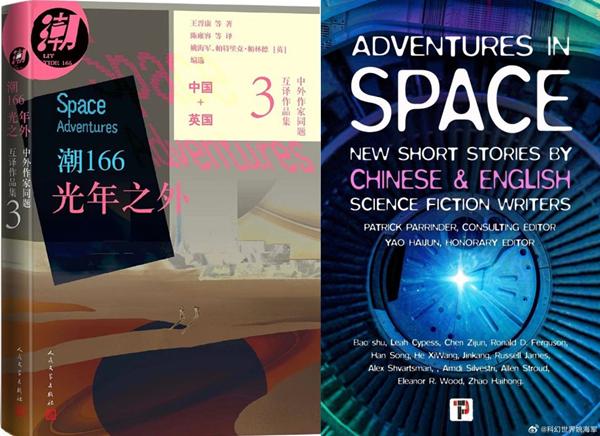Chinese sci
Several Chinese sci-fi writers as well as China's sci-fi blockbuster "The Wandering Earth II" are among the recently unveiled nominees for this year's Hugo Awards, which will be given during the 82nd World Science Fiction Convention (Worldcon). The convention will be held in August in Glasgow, Scotland, the United Kingdom, with the awards being given on Aug. 11. The Hugo Award is the world's highest accolade for science fiction literature.

Cover artwork for the Chinese and English editions of "Adventures in Space: Short Stories by Chinese and English Science Fiction Writers," a joint Chinese-English translation sci-fi anthology project by Yao Haijun, deputy editor-in-chief of Science Fiction World, and Patrick Parrinder, president of the H.G. Wells Society. This project's included writers received several Hugo Award nominations. [Image courtesy of People's Literature Publishing House and Flame Tree Press]
China's sci-fi titan He Xi's "Life Does Not Allow Us to Meet" and fellow luminary Wang Jinkang's "Seeds of Mercury" are among the nominations for best novella at this year's Hugo Awards. Another prominent figure, Han Song's "Answerless Journey," received a nomination for best short story. These three Chinese literary masters, along with mogul Liu Cixin, are commonly known in China as the "Four Heavenly Kings of Chinese Science Fiction." Although these nominated works are not new works by the authors, they are fresh to international readers, last year being translated by Alex Woodend for inclusion in the book "Adventures in Space: New Short Stories by Chinese & English Science Fiction Writers."
"It's another milestone for Chinese sci-fi development as so many Chinese writers and professionals have received Hugo Awards nominations, regardless of how many nominees eventually win awards. Congratulations!" Wang Jinkang said. Meanwhile, Han Song wrote on his microblog that he was surprised to see so many Chinese names on this year's nomination list as well as expressing his eagerness for the U.K. trip. The U.K. is widely considered the birthplace of sci-fi and has produced many celebrated names in the sci-fi and fantasy genres, including Arthur Charles Clarke, Sir Terry Pratchett and J.R.R. Tolkien.
Another noteworthy entry, Frant Gwo's "The Wandering Earth II," based on a novelette by Liu Cixin is nominated for best dramatic presentation, long form category. It will compete against "Barbie," "Dungeons & Dragons: Honor Among Thieves," "Nimona," "Poor Things" and "Spider-Man: Across the Spider-Verse." "The Wandering Earth II" grossed more than 4.03 billion yuan ($558 million) after its release in China's box offices last January, making it a highly esteemed film in Chinese sci-fi cinema.
Besides "The Wandering Earth II," Liu Cixin also has another critically acclaimed work nominated: "The Three-Body Problem, Part One," the comic book adaptation of his Hugo Award-winning novel. The comic book, written by Cai Jin, Ge Wendi and Bo Mu, with artwork done by Caojijiuridong, is nominated for best graphic story or comic.

A new poster for "The Wandering Earth II" has been released in response to its Hugo Award nomination. [Photo courtesy of G!Film Studio]
Other Chinese nominations include Gu Shi's "Introduction to 2181 Overture, Second Edition" for best novelette, Baoshu's "Tasting the Future Delicacy Three Times" for best short story and Yang Feng's sci-fi historic documentary tomes "Chinese Science Fiction: An Oral History, Vols 2 and 3" for best related work. Tina Wong's interview series with sci-fi figures, "Discover X," has also been nominated for best related work. Additionally, Yang Feng and Liu Weijia are among the nominees in the best editor short form category while China's sci-fi mogul, publisher and editor Yao Haijun is nominee for the best editor long form category. Vloggers Buma, Liu Lu and Liu Chang have all received nominations for best fancast for their program "Science Fiction Fans Buma."
A total of 1,720 valid nominating ballots were received and counted from members of the 2023 and 2024 World Science Fiction Conventions for the 2024 Hugo Awards. Final voting will open in April 2024, according to the Hugo Awards' official site.
Some Chinese nominees who received enough votes to qualify for the final ballot declined the nominations. The most surprising is Hai Ya not accepting a nomination in the best novelette category for his work "The Far North." Hai Ya's work "The Space-Time Painter" won the award for best novelette at the 2023 Hugo Awards that were held in Chengdu. He told China.org.cn, "The memories left in Chengdu from last year are already wonderful enough. This year, I think outstanding predecessors like He Xi and Wang Jinkang are more deserving of the nomination. I am very pleased that their classic works have been translated into English and published, allowing more overseas readers to understand the elegance of Chinese sci-fi."